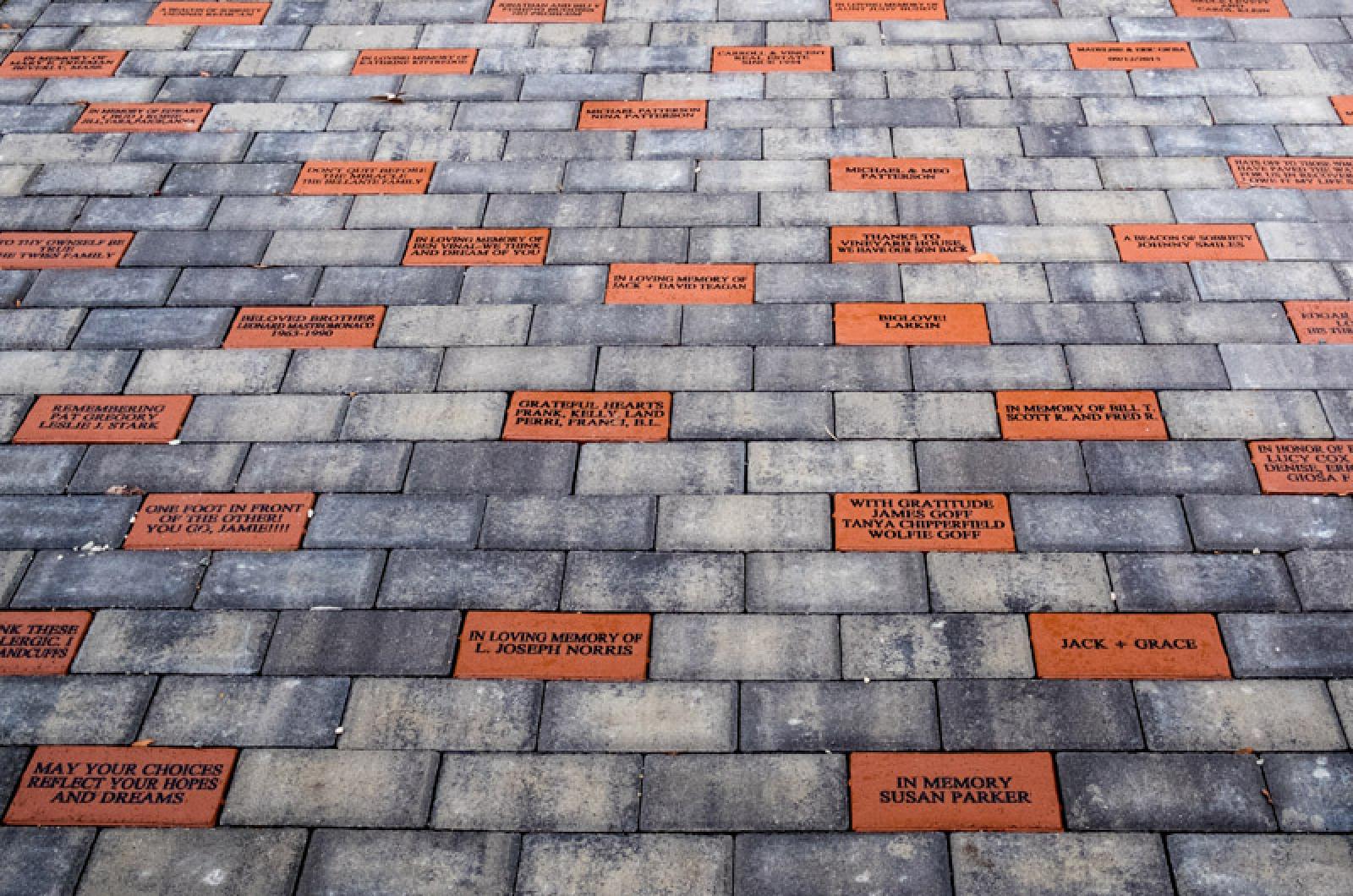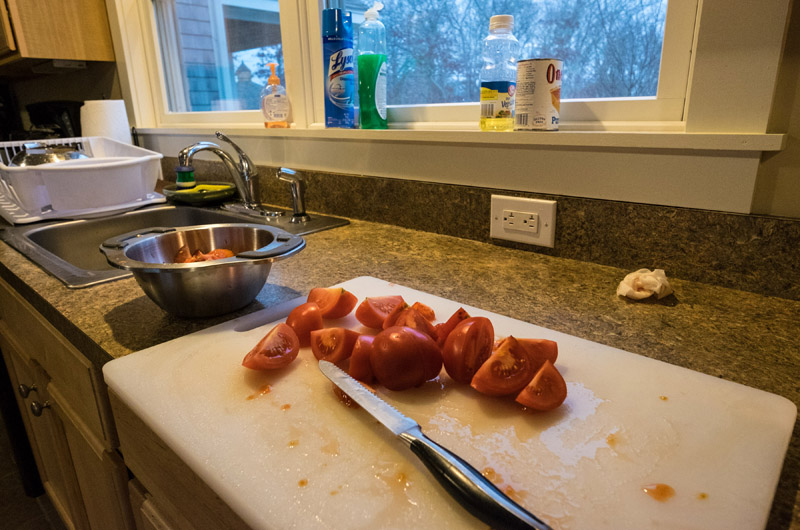The pathway to the administration offices of Vineyard House, the Island’s sober living community, is paved with bricks. Some are part of a fund raising drive, inscribed by the families who donated money. Others are an incentive, given to residents as a reward for one year of sobriety.
Some of the bricks are quite poignant. One reads, “Thank you Vineyard House. We have our son back.”
Others express gratitude for the people who have worked so hard, like the one in honor of Hazel Teagan, a nurse who has helped hundreds of people struggling with addiction. It was given by Dana Anderson, a former president of the board of directors.
Still other bricks are an inspiration, like the simple message that says, “4/24/80 Cheryl.” It was the day she got sober.
The path, like everything else at Vineyard House, is “a way home.”
Founded in 1997, the Vineyard House serves as transitional housing for people coming out of recovery programs who are not quite ready to take on the risk of relapse, or for anyone who needs a safe, supportive home until they can get their feet back on the ground. One year after opening the doors to the new campus in Vineyard Haven, some surprising things are happening to the men and women who call Vineyard House home for a while. Many surprises are good, some are alarming.
Mark Jenkins, president of the board of directors for the past decade, said the goal of the new facility was to create an environment where people wanted to stay longer, improving their chance of staying sober.
“That’s what’s happened,” Mr. Jenkins said. “It’s not just the physical environment, although that’s part of it, but it’s the improved self-esteem people have being in that environment. When new guys come in, guys take care of them. They point them in the right direction, often they’ll give them a few bucks. It’s an amazing dynamic. It’s so heartening.”
Not so heartening, is the age of people who need Vineyard House services. Currently the age of the residents ranges from 18 to 62, and it’s getting younger all the time, according to Dawn Bellante-Holand, who is the managing director of the campus. She said the staff once primarily helped people addicted to alcohol, but now see many people addicted to prescription narcotics or heroin, or a combination of several drugs.
“We’ve been seeing a much younger population,” she said. “The difference in ages is really something that’s remarkable, and that’s been happening over the last five years.”
There is still a new feeling to the Vineyard House campus. The shingles aren’t quite weathered yet. Inside, the kitchen still has a new building shine.
A resident is preparing dinner, one of the chores he is assigned. Though he said he is proud of his recovery, and did not mind that his name was used, the Gazette will not reveal his identity.
“You can’t go hungry in our house. You walk in, you don’t have anything, if you smoke you’ll have a pack of cigarettes, you’ll have rides always. You will always have food until you get on your feet, and somebody will find you a job,” he said. “What we do here is the pay it forward thing. You are responsible for the next person who comes in, you do the same exact thing.”
He was quick to point out that the spotless kitchen was not cleaned up just for visitors. He said the residents take pride in the new building. He runs down the planned activities posted on a communal bulletin board, including game night, Karaoke night, bowling excursions and yoga classes. Keeping busy helps recovery.
“Since it’s a gift, I respect that, and I do my best,” he said.
The Vineyard House is set up to provide structure. In the first month, there are restrictions and requirements. There is a strict curfew, and residents are required to attend 12-step programs, one every day at the beginning of their stay. As the months pass, the restrictions are relaxed. Everyone is required to work, and they have to pay rent.
A tall Christmas tree brightens the common area on the first floor of the men’s building, where all 17 beds were filled this week. The holidays can be a fragile time for someone recovering from addiction, especially for residents who have families.
“The damage we have inflicted on our families, leaves some sour taste,” the resident said. “Those are the ones you hurt the most, the ones you love the most.”
There are seven beds in a separate building for women, with five residents at the moment. The house manager for the past four years, was once a resident, struggling to overcome her own addiction. The Gazette will keep her name private also, though she, too, said she was proud of her recovery.
She keeps order, enforces curfews, administers random drug and alcohol screening, and passes on her experience. She said she doesn’t see her job as a duty.
“It’s kind of enjoyable, watching these women come in and doing a few simple things to help them follow the guidelines,” she said. “It goes far beyond that. I think I get more from it than they do sometimes.”
She said women face many of the same pressures as men while trying to beat addiction. But some pressures are different, including responsibility for children.
“They’re either struggling to get them back, or struggling for visitation,” the house manager said. “They usually borrow money to pay for the first week’s rent and their security deposit, which is a little bit of a chunk of change.”
Vineyard House residents can stay as long as 18 months, and the staff recommends that everyone stay at least six months. One of the most difficult pressures is the urge to leave early, before the routine of structure and sobriety becomes second nature.
That brick pathway is a reminder of those perils. It serves as reinforcement and inspiration, a place to make tributes permanent, and a place to set goals. There is also another category of bricks in the path, those which serves as memorials.
“People are dying on the Island,” Ms. Bellante-Holand said. “When someone leaves, we do everything we can to tell them we would love for you to stay, this is how you’re going to stay sober and stay safe. We’ve seen two deaths (recently) of people who chose a different way. It doesn’t have to happen. This really is a place of miracles. You just have to stay with it.”










Comments (4)
Comments
Comment policy »